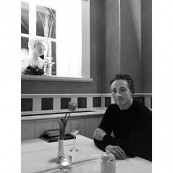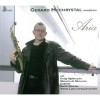| Country: | Ireland |
| Period: | Contemporary classical music |
Biography
Michael McGlynn (born 1964 in Dublin, Ireland) is an Irish composer, producer, director and founder of Anúna.
McGlynn was born in Dublin, and attended Coláiste na Rinne[1] and Blackrock College. He was a student of Music and English at University College Dublin and Trinity College where he studied for an M.Litt degree. He was a member of the professional choral ensemble the RTÉ Chamber Choir and in 1987 he founded the Irish choral group Anúna. Anúna have released fourteen albums, almost exclusively featuring his arrangements and original works. "Deep Dead Blue" was nominated for a Classical Brit Award in 2000 and went top 5 in the UK Classical Charts. "Anúna : Celtic Origins" was the biggest selling World Music CD in the USA in August 2007 according to Nielsen Soundscan [10], and remains in the top twenty albums of the Billboard World Music Charts in early 2008. Although best known as a writer of choral music, Michael has written orchestral and instrumental work. 2007 saw the premiere of the cantata "St. Francis" commissioned by RTÉ, the Irish National broadcaster, which is a setting of texts associated with Francis of Assisi for tenor, choir and symphony orchestra. "Behind the Closed Eye", written for the Ulster Orchestra, Northern Ireland's premiere orchestra, has been successful as a CD release.
Michael has written music for theatre, including the Adrian Noble/Cusack family production of Anton Chekhov's "Three Sisters" at the Gate Theatre, Dublin, and the Royal Court, London. He is also a vocal and choral clinician, working recently in the University of Miami (U.S.A.), Sumida Hall (Japan) and Festival 500 in Newfoundland (Canada). He was an Eminent Scholar at Florida Atlantic University for the 2011-2012 academic year.[2] Michael's music has been recorded and performed by such internationally recognised performers and ensembles as Rajaton, Dawn Upshaw, the National Youth Choir of Great Britain, The Dale Warland Singers, The Phoenix Chorale [formerly the Phoenix Bach Choir], Conspirare, the BBC Singers and Chanticleer.
His harmonic language combines elements of traditional Irish music such as modal melodic lines and ornamentation, fixed and shifting drones and liberal use of jazz-tinged chordal clusters and sonorities. These features can be heard in his contribution to the Chanticleer commissioned "And on Earth Peace : A Chanticleer Mass". Michael contributed the "Agnus Dei" to this multi-composer work.[3] McGlynn says "One of the misapprehensions about my music is that I am not actually concerned with saving Irish traditional music; I am not a traditionalist. The only exposure I had [to traditional Irish song] was during my year at Coláiste na Rinne in Dún Garbhán. The songs that I set are not from a specific collection; they are more impressions of the songs I remembered."[4]
McGlynn also created new compositions that could be perceived as arrangements of Irish songs but were, in fact, new melodies composed to traditional texts. He has stated that "People just assume that I have just found a “living” version. In fact I have done what has made solo traditional music so viable: I have created a new version. I take the songs and reinterpret them in a new way. My priority is always to create a choral version that works." [4] His most successful choral work in this genre is "Dúlamán", a setting of the traditional Irish poem of the same name. This work has been performed and recorded extensively by professional choral groups such as Chanticleer and Cantus (vocal ensemble). It features another characteristic aspect of his musical language in its use of multiple alternating rhythms.
Karen Marrolli for her 2010 thesis on McGlynn writes "Throughout all of McGlynn’s work, while there are a good amount of compositional thumbprints and overarching characteristics, there also is a great deal of variety. This is an incredibly refreshing aspect to McGlynn’s choral writing. Various constant influences are present in his music and give his canon a sense of identity; however, he does not simply reconstruct successful pieces over and over again in an attempt to rest on his laurels. His body of work displays a great range of techniques and musical ideas and continues to develop and mature. Further study of some of his more recently recorded works, such as “O Maria” and the brilliant work “Victimae” (both released on the 2009 Anúna CD Sanctus) would reveal how his musical influences factor into his compositional efforts in ever-evolving ways. This continuous growth bodes well for the longevity of this composer as he takes his place among the important composers of our time.







